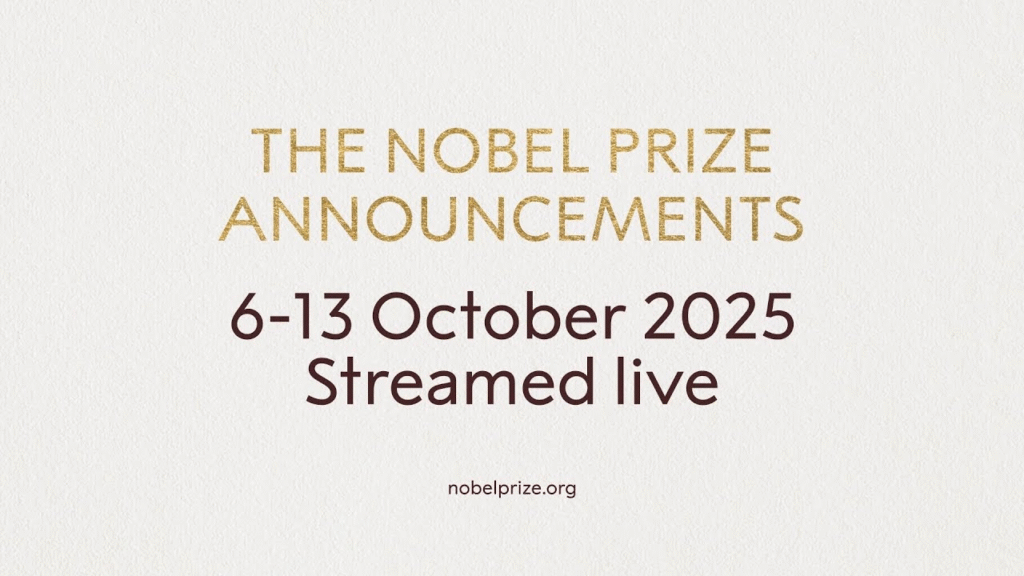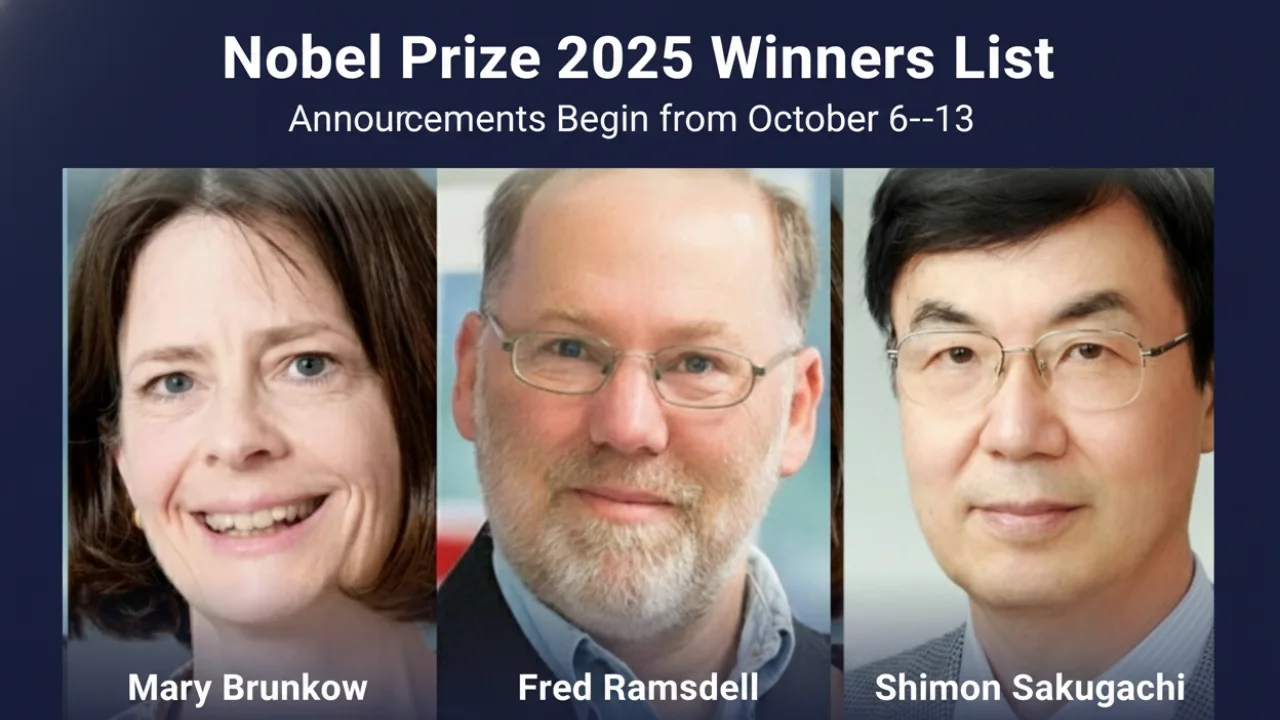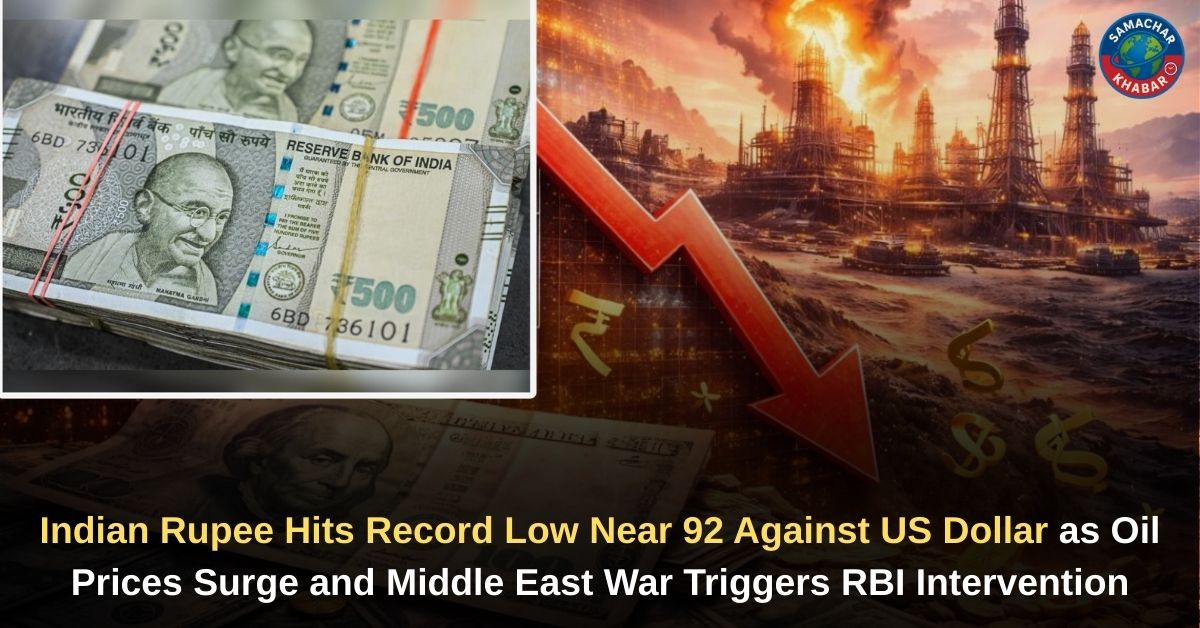The wait is over! The Nobel Prize 2025 week has begun, honouring pioneers transforming science, literature, and peace. Mary Brunkow, Fred Ramsdell & Shimon Sakaguchi win in Medicine for immune tolerance research. Stay tuned for Physics, Chemistry, Literature, Peace & Economics awards.
Key Takeaways Nobel Prize 2025 Winners List:
- Nobel Prize 2025 began on October 6, celebrating humanity’s most transformative achievements.
- Mary E. Brunkow, Fred Ramsdell, and Shimon Sakaguchi won in Physiology or Medicine (भौतिकी या चिकित्सा) for discoveries in peripheral immune tolerance (पेरिफेरल इम्यून टॉलरेंस).
- Prizes will continue to be announced till October 13, covering Physics (भौतिकी), Chemistry (रसायन शास्त्र), Literature (साहित्य), Peace (शांति), and Economic Sciences (आर्थिक विज्ञान).
- Each laureate receives a gold medal, diploma, and cash prize of 11 million Swedish kronor (~$1.2 million).
- The Nobel Foundation (नोबेल फाउंडेशन) oversees the prizes, ensuring authenticity and adherence to Alfred Nobel’s will.
The Significance of the Nobel Prize
The Nobel Prize remains the world’s most prestigious award, recognising individuals and organisations whose work has significantly benefited humanity. First awarded in 1901, these prizes were established by Alfred Nobel, the Swedish chemist, engineer, and inventor of dynamite.
The prizes honour outstanding achievements across six categories:
- Physics (भौतिकी)
- Chemistry (रसायन शास्त्र)
- Physiology or Medicine (भौतिकी या चिकित्सा)
- Literature (साहित्य)
- Peace (शांति)
- Economic Sciences (आर्थिक विज्ञान)
Nobel Prize 2025: Medicine Leads the Way
Laureates: Mary E. Brunkow, Fred Ramsdell, and Shimon Sakaguchi
- Achievement: Discoveries concerning peripheral immune tolerance (पेरिफेरल इम्यून टॉलरेंस)
- Impact: Their work has paved the way for new treatments for autoimmune diseases and cancer, creating a foundational field of research in immunology.
According to the Nobel Assembly at Karolinska Institutet, “Their discoveries have laid the foundation for a new field of research and spurred the development of novel therapies that improve human health”
(Source: Nobel Assembly).
About Alfred Nobel and the Origin of the Nobel Prize
Alfred Nobel was born in 1833 in Stockholm, Sweden. A prolific inventor and scientist, he held 355 patents, including the invention of dynamite (डायनामाइट), which earned him immense wealth. Despite his inventions, Nobel was concerned about his legacy after reading a premature obituary that labelled him the “Merchant of Death.” This reflection inspired him to leave a positive mark on humanity.
In 1895, Nobel wrote his will, dedicating 94% of his fortune to create a fund that would annually award those who “have conferred the greatest benefit to humankind.” Following his death in 1896, the first Nobel Prizes (नोबेल पुरस्कार) were awarded in 1901, covering five fields: Physics, Chemistry , Physiology or Medicine, Literature, and Peace . In 1968, Sweden’s central bank added the Prize in Economic Sciences to honour Nobel’s legacy.
Nobel Prize in Physiology or Medicine 2025 – NobelPrize.org
What Do Nobel Laureates Receive?
Every laureate is awarded:
- A gold medal (सोने का पदक)
- A diploma (डिप्लोमा) certifying their achievement
- A cash prize (नकद पुरस्कार), which in 2025 amounts to 11 million Swedish kronor (~$1.2 million)
These awards recognise not only outstanding achievements but also the enduring impact of their work on humanity and global progress.
Upcoming Nobel Prize Announcements

The schedule for Nobel Prize 2025 is as follows:
- October 7 – Physics: Royal Swedish Academy of Sciences
- October 8 – Chemistry: Royal Swedish Academy of Sciences
- October 9 – Literature: Swedish Academy, Stockholm
- October 10 – Peace: Norwegian Nobel Committee, Oslo
- October 13 – Economic Sciences: Royal Swedish Academy of Sciences
This sequence ensures a week-long global spotlight on pioneering work that drives scientific discovery, cultural enrichment, and peace-building.
Indian Nobel Laureates: A Proud Journey of Excellence
- Rabindranath Tagore – Literature (1913)
Contribution: Honoured for “Gitanjali”, bringing Indian literature to the global stage.
2. C. V. Raman – Physics (1930)
Contribution: Awarded for discovering the Raman Effect, related to the scattering of light.
3. Har Gobind Khorana – Physiology or Medicine (1968)
Contribution: Decoding the genetic code and advancing protein synthesis research.
4. Mother Teresa – Peace (1979)
Contribution: For her dedicated service to the poor and sick in Kolkata, India.
5. Subrahmanyan Chandrasekhar – Physics (1983)
Contribution: Pioneering work on the structure and evolution of stars.
6. Amartya Sen – Economic Sciences (1998)
Contribution: Advancements in welfare economics and social justice policies.
7. Venkatraman Ramakrishnan – Chemistry (2009)
Contribution: Studying the structure and function of ribosomes.
8. Kailash Satyarthi – Peace (2014)
Contribution: Fighting for children’s rights and global education initiatives.
9. Abhijit Banerjee – Economic Sciences (2019)
Contribution: Experimental contributions to reduce global poverty.
How Are Nobel Laureates Chosen?
The nomination process is meticulous, maintaining secrecy and independence. Each year, Nobel committees invite past laureates, selected experts, and academics to submit nominations by January 31.

- Self-nominations are not allowed, but candidates can be nominated multiple times by others.
- Committee members review hundreds of nominations, consulting specialists to evaluate the long-term impact (दीर्घकालिक प्रभाव) of discoveries.
- Science prizes typically take decades to confirm, ensuring research withstands the test of time.
This rigorous selection process guarantees that Nobel Prizes recognise only the most impactful contributions to humanity.
Also Read: Inside the Gaza Flotilla Arrest: Greta Thunberg’s Alleged Ordeal in Israeli Custody
Nobel Prize Ceremony: Honouring Excellence
The awards are presented in twin ceremonies:
- Stockholm: For Physics, Chemistry, Medicine, Literature, and Economic Sciences, with Sweden’s royal family in attendance.
- Oslo : For the Peace Prize, presented by the Norwegian Nobel Committee (नॉर्वेजियन नोबेल कमेटी) at Oslo City Hall.
Each laureate is awarded their medal, diploma, and cash prize, accompanied by speeches highlighting the global significance of their work. The event culminates in the Nobel Banquet, attended by royalty, diplomats, scientists, and past laureates, symbolising international recognition and celebration of excellence.
Nobel Peace Prize 2025: A Global Focus
This year, the Nobel Peace Prize is under intense scrutiny due to ongoing global conflicts, including the war in Ukraine and tensions in Gaza.

While former US President Donald Trump has claimed consideration for the award, experts stress that the committee prioritises sustainable peace, international fraternity, and the quiet work of institutions fostering long-term stability.
According to Ylva Engstrom, vice president of the Royal Swedish Academy of Sciences, “Academic freedom … is one of the pillars of the democratic system,” highlighting the role of independent research in global peace initiatives (Source: Reuters).
Remembering Previous Laureates
The 2024 Nobel Prize winners set high benchmarks for 2025:
- Medicine: Victor Ambros & Gary Ruvkun for microRNA research
- Physics: John Hopfield & Geoffrey Hinton for advances in machine learning
- Chemistry: David Baker, Demis Hassabis, John Jumper for computational protein modelling
- Literature: Han Kang, South Korean novelist
- Peace: Nihon Hidankyo, Japanese anti-nuclear campaigners
- Economic Sciences: Daron Acemoglu, Simon Johnson & James Robinson for institutional impact on growth and inequality
These laureates exemplify humanity-driven innovation (मानवता प्रेरित नवाचार) across disciplines.
Nobel Prize 2025: Why It Matters

The Nobel Prize is more than an award; it is a global benchmark for excellence, inspiring generations to explore, discover, and create.
It highlights:
- The critical importance of research and innovation (अनुसंधान और नवाचार)
- Commitment to peace and human welfare (शांति और मानव कल्याण)
- The enduring legacy of Alfred Nobel’s vision (अल्फ्रेड नोबेल का दृष्टिकोण)
- Every laureate’s contribution reaffirms the transformative power of knowledge in shaping a better world.
The Lasting Impact of Nobel 2025
The Nobel Prize 2025 week demonstrates that human ingenuity, dedication, and ethical pursuit of knowledge continue to reshape society. From groundbreaking medical research to global peace initiatives, these awards remind us that excellence is not just recognised but celebrated on a world stage.
As the remaining winners are announced, the global community watches with anticipation, inspired by the unwavering commitment of individuals and institutions to advance science, culture, and harmony. The Nobel Prizes remain a timeless symbol of human achievement, honouring those who truly confer the greatest benefit on mankind.
The Spiritual Insight Behind True Knowledge: Wisdom of Saint Rampal Ji Maharaj Ji
Beyond worldly achievements like the Nobel Prize, the greatest pursuit remains the realization of the Supreme Truth. Saint Rampal Ji Maharaj Ji imparts unique knowledge that guides souls toward eternal peace, liberation, and understanding the ultimate purpose of human life. While scientific discoveries advance society materially, His teachings illuminate the spiritual path, showing how true knowledge and devotion can elevate the soul beyond the limitations of worldly accolades.
For more authentic spiritual knowledge and guidance, visit www.jagatgururampalji.org.
FAQs on Nobel Prize 2025 Winners and Schedule
1. Who won the Nobel Prize 2025 in Physiology or Medicine?
Mary E. Brunkow, Fred Ramsdell, and Shimon Sakaguchi won the 2025 Nobel Prize in Physiology or Medicine for their discoveries concerning peripheral immune tolerance , which have advanced treatments for autoimmune diseases and cancer.
2. When will the Nobel Prize 2025 winners be announced?
The Nobel Prize 2025 announcements run from October 6 to October 13, 2025:
- October 6: Medicine
- October 7: Physics
- October 8: Chemistry
- October 9: Literature
- October 10: Peace
- October 13: Economic Sciences
3. What do Nobel laureates receive?
Each laureate receives:
- A gold medal
- A diploma
- A cash prize of 11 million Swedish kronor (~$1.2 million in 2025)
4. Who was Alfred Nobel and why was the prize established?
Alfred Nobel (1833–1896), the Swedish chemist and inventor of dynamite, established the Nobel Prizes in his will to honour individuals and organisations that “have conferred the greatest benefit to humankind.” The first prizes were awarded in 1901, and the Economic Sciences category was added in 1968.
5. Where are the Nobel Prizes awarded and how is the ceremony conducted?
- Stockholm, Sweden: For Physics, Chemistry, Medicine, Literature, and Economic Sciences, presented by the King of Sweden.
- Oslo, Norway: For the Peace Prize, presented by the Norwegian Nobel Committee.
The ceremonies include speeches highlighting each laureate’s contribution, followed by the Nobel Banquet attended by royalty, diplomats, and past winners.














